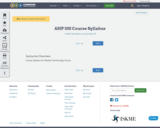
Course Syllabus for Medical Terminology Course
- Subject:
- Health, Medicine and Nursing
- Material Type:
- Syllabus
- Author:
- Carmen Bravo
- Date Added:
- 06/15/2022

Course Syllabus for Medical Terminology Course
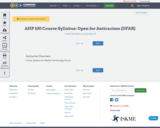
Course Syllabus for Medical Terminology Course
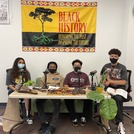
The Open for Antiracism (OFAR) Program – co-led by CCCOER and College of the Canyons – emerged as a response to the growing awareness of structural racism in our educational systems and the realization that adoption of open educational resources (OER) and open pedagogy could be transformative at institutions seeking to improve. The program is designed to give participants a workshop experience where they can better understand anti-racist teaching and how the use of OER and open pedagogy can empower them to involve students in the co-creation of an anti-racist classroom. The capstone project involves developing an action plan for incorporating OER and open pedagogy into a course being taught in the spring semester. OFAR participants are invited to remix this template to design and share their projects and plans for moving this work forward.
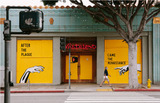
Syllabus.
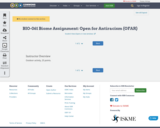
Outdoor activity, 25 points.

The Open for Antiracism (OFAR) Program – co-led by CCCOER and College of the Canyons – emerged as a response to the growing awareness of structural racism in our educational systems and the realization that adoption of open educational resources (OER) and open pedagogy could be transformative at institutions seeking to improve. The program is designed to give participants a workshop experience where they can better understand anti-racist teaching and how the use of OER and open pedagogy can empower them to involve students in the co-creation of an anti-racist classroom. The capstone project involves developing an action plan for incorporating OER and open pedagogy into a course.I share 3 resources here from my Introduction to Biology course: our syllabus with specifications grading (complete/incomplete grading with unlimited revisions) and no late penalties, our Biologist Biographies project, and our content curation project. Please adapt these resources to make your own course more antiracist!

This semester, we will be implementing a group activity where we look at the histology for the leading causes of death while also exploring how these diseases disproportionately affect people of color in America. There are several components of this project that culminate in a video presentation that can be used to inform our Merritt and employer community about these diseases and how they negatively impact us. This project will be done in several steps or 7 Modules as outlined below.
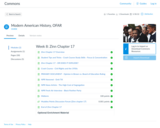
This Canvas shell includes a sample syllabus for a Modern American History course using OER resources. The shell also has two sample modules which include discussion prompts and a sample midterm assignment. Each module has a corresponding announcement that would be sent out at the beginning of the week to remind the students of the work to be done.
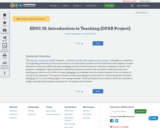
The Open for Antiracism (OFAR) Program – co-led by CCCOER and College of the Canyons – emerged as a response to the growing awareness of structural racism in our educational systems and the realization that adoption of open educational resources (OER) and open pedagogy could be transformative at institutions seeking to improve. The program is designed to give participants a workshop experience where they can better understand anti-racist teaching and how the use of OER and open pedagogy can empower them to involve students in the co-creation of an anti-racist classroom. The capstone project involves developing an action plan for incorporating OER and open pedagogy into a course being taught in the spring semester. OFAR participants are invited to remix this template to design and share their projects and plans for moving this work forward.

This resource contains assignment details for the co-creation of a class "dictionary" of terms/phrases used by students in their speech communities. Dictionary is in quotes here because it's not a true dictionary; rather, it contains extended definition and analysis of chosen terms, as well as evidence of their use "in the wild" (i.e. in the world). This module also contains a project overview and a warm-up exercise that support the main project, as well as ideas for complimentary assignments for use in a themed course. Please see the "For instructors" page for more on framing this assignment as anti-racist. This work is licensed under CC BY-NC-SA 4.0

This resource contains assignment details for the co-creation of a class "dictionary" of terms/phrases used by students in their speech communities. Dictionary is in quotes here because it's not a true dictionary; rather, it contains extended definition and analysis of chosen terms, as well as evidence of their use "in the wild" (i.e. in the world). This module also contains a project overview and a warm-up exercise that support the main project, as well as ideas for complimentary assignments for use in a themed course. Please see the "For instructors" page for more on framing this assignment as anti-racist. This work is licensed under CC BY-NC-SA 4.0

In this 16-week composition course, students explore, discuss, read about, write about, and research food. More specifically, they delve into specific and varied aspects of food like food and identity, food and culture, food and the brain, food production, food marketing, and food access. In doing so, this learning community considers how and why food is the perfect avenue for learning about themselves, for recognizing and valuing their "already" banks of knowledge, and for knowing the fascinating, ever-changing, and often challenging world in which they live.

In this module we discuss community in a variety of ways, from fiction and non-fiction. The module is mostly face to face, with online follow-up to practice written expression of their experience. The module finishes with a guest speaker from a First Nation, Miwok Rancheria. This guest builds on the readings, expands our ideas of who is in our community (city), and provides a face-to-face introduction and discussion with a member of the Miwok Nation (an experience no student had up to this point).

The Open for Antiracism (OFAR) Program – co-led by CCCOER and College of the Canyons – emerged as a response to the growing awareness of structural racism in our educational systems and the realization that adoption of open educational resources (OER) and open pedagogy could be transformative at institutions seeking to improve. The program is designed to give participants a workshop experience where they can better understand anti-racist teaching and how the use of OER and open pedagogy can empower them to involve students in the co-creation of an anti-racist classroom. The capstone project involves developing an action plan for incorporating OER and open pedagogy into a course being taught in the spring semester. OFAR participants are invited to remix this template to design and share their projects and plans for moving this work forward.
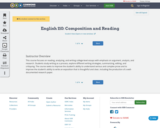
This course focuses on reading, analyzing, and writing college-level essays with emphasis on argument, analysis, and research. Students study writing as a process, explore different writing strategies, summarizing, editing, and critiquing. The course seeks to improve the student’s ability to understand serious and complex prose and to improve the student’s ability to write an exposition that is thoughtful and clear, including the production of a well-documented research paper.

The Open for Antiracism (OFAR) Program – co-led by CCCOER and College of the Canyons – emerged as a response to the growing awareness of structural racism in our educational systems and the realization that adoption of open educational resources (OER) and open pedagogy could be transformative at institutions seeking to improve. The program is designed to give participants a workshop experience where they can better understand anti-racist teaching and how the use of OER and open pedagogy can empower them to involve students in the co-creation of an anti-racist classroom. The capstone project involves developing an action plan for incorporating OER and open pedagogy into a course being taught in the spring semester. OFAR participants are invited to remix this template to design and share their projects and plans for moving this work forward.

Phy. Geo. Syllabus

This is a Dual Enrollment Syllabus for a US history course from 1877-Present.
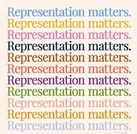
The resource provided is a semester long project that asks students to add to the historical record by researching and writing three narratives about marginalized individuals in modern US history. After the narratives are complete, students will compile their work on an ePortfolio using Google Sites. Provided are directions for the project as well as an exemple of the final ePortfolio linked at the bottom of the instructions.
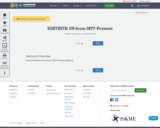
Dual Enrollment US history (1877-Present) Syllabus.